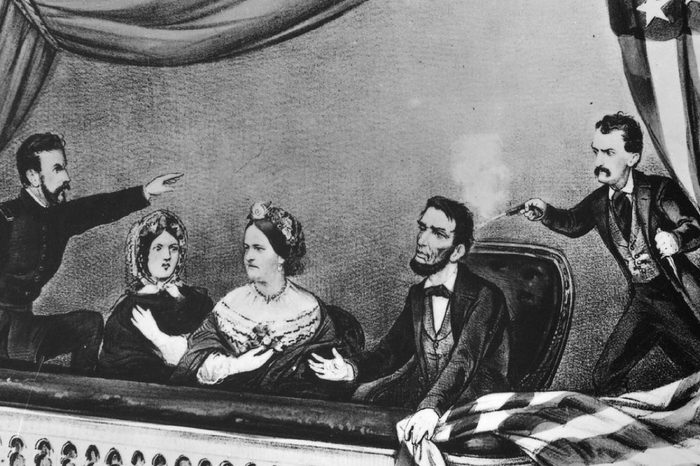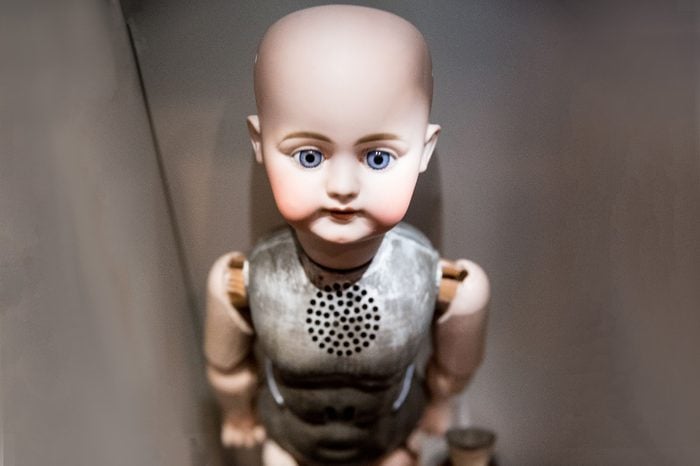Historical Facts You’ll Wish Weren’t Really True
Scary, unnerving, and often just plain bizarre, these are the history facts that probably didn't make it into your textbook.

History is stranger than fiction—and frequently grosser and more frightening as well.
King Tutankhamun, a young Egyptian pharoah, is depicted in this statue.
ANONYMOUS/AP/REX/SHUTTERSTOCK

Most likely, King Tut's parents were siblings.
Here is what scientists know about the kid king and his family once you stop shivering in disgust. It is almost certain that Akhenaten, who served as the pharaoh before Tut in the fourteenth century BC, was his father. His mother's name is mostly unknown, although new DNA testing on mummies including his and others has shown that she was likely one of Akhenaten's sisters. King Tut was quite weak and had a bone condition, possibly as a result of his parents. However, incestuous relationships were not unusual in ancient Egypt, which is not exactly comforting. Tut is remembered in history as one of Egypt's most illustrious and prosperous pharaohs despite having health problems and having a short lifespan even by those times (he passed away at the age of 19). View these further unanswered questions concerning the ancient world.
ASSASSINATION OF ABRAHAM LINCOLN BY JOHN WILKES BOOTHREX/SHUTTERSTOCK
Abraham Lincoln was unsuccessfully saved by someone, and things only grew worse for him after that.
The drawing The Assassination of President Lincoln from the 1860s is undoubtedly well-known to you. But who are those two individuals seated in the private box next to the unfortunate president and his wife? Major Henry Rathbone is the person scurrying into action on the far left. He and his fiancée, Clara Harris, were specifically asked to go to the theatre with the President and Mrs. Lincoln. Rathbone attempted to tackle Booth to the ground after he fired the shot, but Booth was able to escape by stabbing Rathbone in the arm with a knife. Rathbone apparently felt guilty for allowing Booth to escape that night and was never able to shake the memories and remorse of it. He developed a variety of health problems during the ensuing years, including heart palpitations and stomachaches, and his mental condition also declined. He attacked and killed Clara, who was now his wife, on December 23, 1883 (18 years after the assassination), and then made an attempt on his life. He would reside in a mental hospital for the remainder of his life. Don't miss these inspirational quotations from Abraham Lincoln.
ADVERTISEMENT

a man who has tertiary Syphilis. the author Jules Rengade The Grands Maux and the Grand Remedes, Paris, ca. 1890.SHUTTERSTOCK/UNIVERSAL HISTORY ARCHIVE
The closest approach to a real-life zombie outbreak occurred in Europe in 1494.
There is a significant, though little-known, dark side to the Italian Renaissance. An extensive syphilis infection brought back by sailors from the New World spread throughout the whole French army. The soldiers later spread what became known as "the great pox" throughout the rest of Europe. Since there were no antibiotics available at the time, the sickness may spread unchecked and had unpleasant side effects. The disease's gruesome sores would ultimately cause the skin on victims' faces to rot away. In some instances, the infected individuals' noses, lips, or other body parts were virtually gone, and several of the patients finally passed away from the illness. While there were many positive aspects of the European Renaissance, the syphilis epidemic that occurred at the same time was essentially a real-life zombie apocalypse. Nothing major. These are the well-known historical events that never took place.
dirty shovel resting on a wooden table
LADUHIS72/SHUTTERSTOCK
A young woman's body was discovered by 19th-century New Englanders. since they believed she was a vampire

The Salem Witch Trials are obviously well-known, but what about the "Rhode Island Accused Vampire"? When a tuberculosis outbreak—then known as "consumption"—hit Connecticut, Rhode Island, and Vermont in the late 1800s, the locals had no idea what to make of it. People claimed that its victims had been preyed upon by vampires because they frequently seemed sunken, pallid, and exhausted. So it was only logical that a "vampire hunt" quickly started. The residents of Exeter, Rhode Island, concluded that someone in the family must be "feeding" on the others when successive members of the family started passing away from consumption. The townpeople made the decision to exhume the bodies even after the mother, Mary Brown, and her two daughters had passed away because they thought one of the bodies might actually be "undead."
Mercy, Brown's 19-year-old daughter, had passed away much more recently than the rest of her family, and as a result, her body was in much better shape. Even though, there was still some rotting blood in her heart, which was a surefire indicator of vampire status. So they destroyed her heart and liver and combined the ashes with water to stop her from "striking" again. The other town resident who was afflicted was subsequently given the mixture as a "cure." Unsurprisingly, it was a failure. Here are a few more bizarre folk treatments you wouldn't think existed.
Inventor Thomas Edison The American Enterprise exhibit at the Smithsonian National Museum of American History on the National Mall in Washington, D.C., features Thomas Edison's talking doll. This exhibit, which debuts on July 1st, brings a range of resources together to illustrate the tale of American business, capitalism, and invention from the middle of the 1700s to the present.
SHUTTERSTOCK/ANDREW HARNIK

Thomas Edison produced a terrifying infant doll.
Despite all of his achievements, Thomas Edison did fail miserably in his attempt to make the first-ever talking dolls. The tinfoil phonograph, which Edison invented in 1877, was a significant advance in sound recording, and Edison was well aware of the limitless potential of this technology. The invention of the wax cylinder allowed him to create a range of baby dolls in 1890. The dolls were unheard-of in the history of toys, with wooden bodies, porcelain heads, and tiny phonographs hidden within their chests. The phonographs played back recordings of young girls reciting children's rhymes like "Hickory Dickory Dock" and "Now I Lay Me Down to Sleep."
These dolls are the only ones that have ever merited their own horror movie. The dolls are now nightmare fuel for us because of the outdated, jumbled technology, the harsh voices, and the scary faces of the dolls. (If you dare, take a listen here.) However, that was not the real cause of the dolls' failure. Their failure was mostly caused by a number of issues, including the fact that the parts were simple to misplace, the sound was short-lived and difficult to understand, and the micro phonographs were quite brittle. Furthermore, the dolls were just plain costly. Here are some undiscovered Thomas Edison innovations.
ADVERTISEMENT
Dentures from an elderly woman were discovered on a dresser in a dilapidated home.FREAKTOGRAPHY/SHUTTERSTOCK
In the past, deceased soldier teeth were used to make dentures.
When you can have natural teeth, why would you need dentures? Dentists in the nineteenth century had to have thought like that. They used improvised dentures—ivory base plates with real human teeth attached—to fight the outbreak of tooth rot. Dentists may now purchase the teeth that scavengers were already stealing from Waterloo battlefield dead. The choppers were boiled, the roots were removed, they were attached to ivory plates, and they were sold to clients. Mental Floss questions whether the customers knew where the teeth originated. You may decide if that makes it creepier or less disturbing. Here are 60 more bizarre facts that will make you laugh out loud.
CATDAYKINEY/SHUTTERSTOCK
A cat was once transformed into a phone by researchers. a real cat.
You're probably thinking, "You've got to be kitten me," and we agree. Well, regrettably not. Two researchers at Princeton University set out to investigate how the auditory nerve interprets sound in 1929. An unconscious cat served as their test subject. Ernest Wever and Charles Bray, two scientists, removed a portion of the animal's brain and connected a telephone wire to its auditory nerve and a receiver with the other end. Wever heard Bray speaking into the cat's ears through the receiver in the soundproof space. Even though it could have just seemed like a cruel experiment, it really had some positive outcomes; many scientists think it contributed to the creation of cochlear implants. The cat-turned-phone miraculously survived the experiment, nevertheless. But Wever and Bray refrained from dispersing it into the wider world. They killed it instead to determine if the experiment would succeed with a dead cat. Not at all. Find out about some more of the wackiest scientific experiments ever.
JIANGXI, CHINA – July 1:Jiujiang in eastern China experienced significant rainfall, which caused numerous urban areas to flood. The highways were inundated, and the inhabitants took a risky diversion around them.HUMPHERY/SHUTTERSTOCK
There was a fatal molasses flood in Boston.
This is a far cry from the Boston Tea Party. A sizable molasses tank exploded in Boston's North End in January 1919. A molasses flood may sound like something out of Cloudy with a Chance of Meatballs, but it wasn't funny. Nearly 2.5 million gallons of the gooey fluid were trapped in the tank and discharged, rushing through the streets at a speed of 35 miles per hour. With a height of almost fifteen feet and a death toll of 21, it was essentially a full-on tsunami. Additional 150 persons sustained injuries, and homes and buildings had their foundations shaken. Emergency personnel struggled to access the victims because they had to wade through the gummy mud. It took Bostonians weeks to clear up the mess, and many locals asserted that, even years later, they could still smell the molasses' sickly-sweet odour in the summertime heat. Don't miss these challenging questions about American war history that few people can correctly answer.
A king forced his peasants to worship his beloved's dead body.

This story of star-crossed lovers quickly became bizarre. Don Pedro, the son of the monarch of Portugal in the fourteenth century, fell in love with Inês de Castro. There were just a few issues with this. First, because Inês was an illegitimate child, King Afonso IV did not agree. Another reason was that Don Pedro was wed. Constanza was the noblewoman his father had set up for him to marry, while Inês served as her lady in waiting. The king ordered her execution when Don Pedro refused to stop seeing her. Two years later, Don Pedro took the throne. He exhumed her body, dressed it in regal garb, and "crowned" her queen. He allegedly forced the other nobility to kiss her hand in order to show their love for her. Everyone errs on these historical questions.
Sources:
King Tut was inbred, malnourished, and his mysteries have been solved, according to National Geographic.
The White House Historical Association, "Illustration of President Lincoln's Assassination"
According to the New York Historical Society, "Attending Ford's Theatre with the Lincolns: The Tragic Lives of Clara Harris and Henry Rathbone"
JMVH: "Syphilis - Its Early History, Treatment Up Until Penicillin, and the Debate on Its Origins"
"Mercy Brown and the Great Vampire Panic of Rhode Island" is in the lineup.
Smithsonian Magazine article: "The Epic Failure of Thomas Edison's Talking Doll"
According to the BBC, "the dentures made from the teeth of dead soldiers at Waterloo"
When Dentures Were Made From Dead Waterloo Soldiers' Teeth, according to Mental Floss.
"The Cat Telephone" is available at Princeton University's Mudd Manuscript Library.
According to Mental Floss, "101 Years Later: Remembering Boston's Great Molasses Flood of 1919"
Wikipedia: "Inês de Castro"












